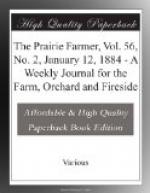At noon Jack, Harry, the sheriff, and a party of armed men from Denver rode up, stopping only a moment to tell me they would be back at night. I dared not tell Mary, and she worried all the afternoon at their strange conduct. At night Jack and Harry came home, looking tired but happy. Then Jack told Mary, and she clung to him as though she could never let him go.
It seemed the pleasing ranchman from Chicago was one of a band of cattle thieves. He sold the hides to Harry, who, honest and open himself, was slow to suspect wrong dealings in others. The sheriff had caught the men skinning a cow that belonged to Mead, and had captured the gang and taken them to Denver.
The men concerned in the attempt to lynch Jack were sincerely sorry. Their regrets would not have availed much, however, if they had succeeded in their purpose. They gave each of the children ten acres of land; they gave Ted sixty-five, and me, whom they pleased to consider very plucky, one hundred and fifty acres. I felt rich enough, and time has made it very valuable land. The man on guard was our warmest admirer. He thought Ted, Shep, and I wonders of courage. He said when I came down on the bridge with the open knife, he thought his last hour had come.
Gil Mead committed suicide not long after this. He was always queer. No one ever knew that Yik Kee set the stack afire. I tell you Jack rewarded the faithful fellow—gave him a good farm, taught him to work it, and built him a house. The funniest thing was Yik Kee had a wife and three queer little children back in China, and Jack sent for them, and Yik Kee and his family are as happy as they can be. The children play with Jack’s (he has twelve now) and get along finely together.
In ’75 I married Harry White, which, I suppose, was foreseen from the beginning—at least, Jack says anybody could have seen it. The most serene and satisfied face at the wedding was that of the Celestial. In my inner consciousness, notwithstanding he is a “heathen Chinee,” I have the conviction that as great a hero as is seen in modern times is the man of few words, Yik Kee.—The Continent.
HUMOROUS
“A LEEDLE MISTAKES.”
“I see all how it vhas now,” observed Jacob Handonder, as he came out.
“Oh, you do! You are the man who got drunk and raised a fuss on a street car?”
“I vhas der man, and I tell you how it vhas. You see, I vhas tight. I took too much beer.”
“Can a saloon-keeper take too much beer?”
“Vhell, maype I vhas seek. I shtart to go home. Vhen der sthreet car comes along I pelief it vhas my house. I got in und look all aroundt, but I doan’ see Katarina. I call out for der shildrens, und eferybody laughs at me. Maype dot makes me madt, und der drifer calls a boliceman, und I vhas galloped down here.”
“So it wasn’t your home?”




